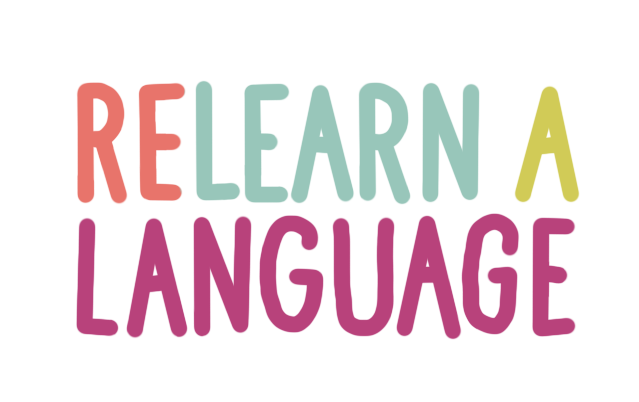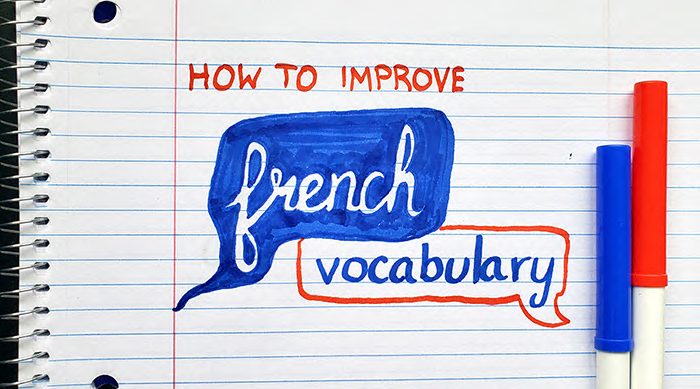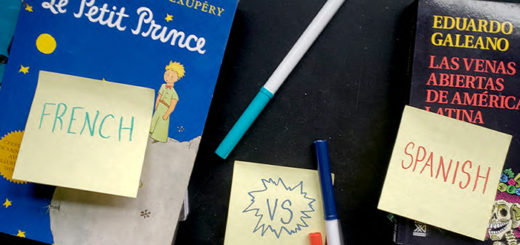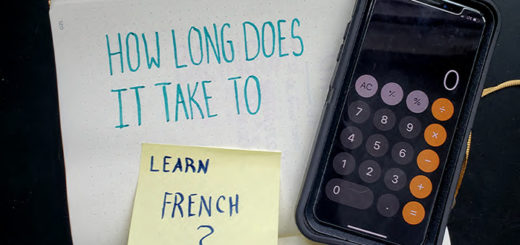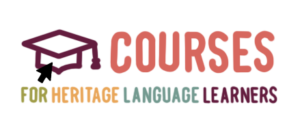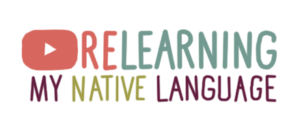How to Improve French Vocabulary (5 Steps)
When I started learning French, I didn’t think much about how to improve French vocabulary.
The accent and grammar were so overwhelming! I got totally caught up in them for two years.
Plus I thought: so many French words are like English words. So French would probably just stick naturally, right?
Well, that attitude is why that after a year of studying French (which was the second language I learned as an adult) I could still barely speak it!
I had mastered French verbs and gotten a good handle on the accent… but I could barely express any ideas.
This article is all about what worked for me.
Because within a year I went from barely being able to string together a sentence to being able to have full conversation about a variety of topics.
Now I can speak French with ease, enjoy more films and books, and generally feel confident when I speak.
And the best part: I did little to no vocabulary memorization drills.
By the end of this article, you’ll have an action plan as to how to maximize your learning time and effectively improve your French vocabulary. This plan will be personalized to your needs and fun to work on!
So let’s begin!
1. Decide what kind of vocabulary you need
Very few of us will actually need all of the words any language has to offer.
So we’re going to change this question from “how to improve French vocabulary” in general to “how can I improve my French vocabulary.”
That subtle change can mean a huge difference not only in our plan of attack but in the outcome as well.
For this tutorial, I’m going to give you two real-life examples. The first example will be about my experience and the second will be about my friend Sara.
That’s because Sara had very different needs than I did for her French than I did.
And I’ll show you how those needs dramatically affected her French study plan.
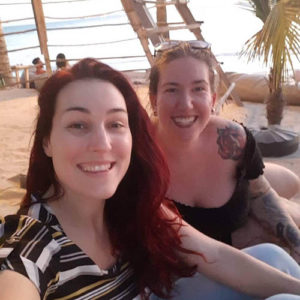
Spending time with French friends has always been hugely motivating for me. Here I am (right) in Mexico with my awesome polyglot friend MK who grew up in French Canada. (Together we normally switch through English, Spanish, and French whenever we speak together!)
Here are a list of my own French vision goals–the things that really motivate me to learn French.
- Maintaining my friendships in Quebec and France
- Working with Haitian clients at work
- Reading French novels and listening to French music
- Listening to news and podcasts in French to learn more bout the world
And here are Sara’s goals:
- Working with her Canadian students who spoke French at home (despite living in an Anglophone part of Canada)
- Having a competitive edge if she needs to look for a new teaching job in the future
- Being a better citizen and neighbor
As you can see, our goals are vastly different.
So how does this impact the French vocabulary each of us wants to improve?
Well, let’s take a look at what kind of vocabulary I myself would need based on my personal French goals.
- Vocabulary about politics, travel, food, wine
- Tech, branding, customer service (I work in digital marketing)
- Anything under the sun!
- News, tech, travel, food, branding
And the vocabulary Sara might want:
- Explaining tasks, colors/shapes, basic English communication (she’s a kindergarten teacher)
- Same as above
- Family, current events, politics/policy
Those are totally different sets of vocabulary!
So when Sarah asked me for how I improve my French vocabulary so consistently, we first looked at how she needed to use her languages to first define her goals. After that, we could determine what kind of French vocabulary she needed to improve.
So right now, figure out what your goals with French are.
Then, figure out what kind of topics you’ll need to be able to discuss to achieve these goals.
Here are a few other examples of what those goals might look like, as well as what kind of vocabulary you need.
- Pass a French test or class. Consult your textbook.
- Speaking better with family. You’ll want a lot of daily life vocabulary, as well as anything else that interests you for hobbies or passions.
- Working in government or politics. On top of vocabulary for political systems and policy, check out vocabulary for history, philosophy, and economics.
- Traveling. Just want to be a tourist? You’ll want food, receiving directions, greetings/politeness, and basic travel necessities (think of what you’ll need to pack or buy).
- Films and TV. Slang is going to be key! Plus, look up words that might be related to your favorite genre.
Keep that list at hand, and in the next steps, we’ll look at how to develop those vocabulary sets.
TIP: Do you feel a bit overwhelmed by how advanced your goels are? Don’t worry if some of your goals feel way beyond your reach right now–we’re going to work you up to them. If you’re motivated, it’s possible!
2. Figure out where you would find this vocabulary in the wild
Now that you have your types of vocabulary you want to improve, we’re going to find out how to find words to add to those lists.
Because let’s face it: just making huge word lists would be super boring!
So where can we find the right vocabulary to help us achieve our French learning goals?
Let’s use my personal goal of wanting to speak better with friends. We love to talk about travel, languages, news, and food. So to start finding words and phrases I would need to have those conversations, I looked to the following sources:
- News sources (print, video, and radio)
- French YouTuber cooking channels
- Podcasts about race, gender, identity, and other socioeconomic questions (in French!)
- French wine documentaries
- French cookbooks
Now, don’t worry if you’re feeling like you couldn’t possibly understand a podcast yet, or have enough vocabulary to do a French recipe. That’s the point! You’re still learning!
So here’s how I started breaking down this goal.
- First I chose wine since that really interested me
- I found French wine tasting tutorials on YouTube and watched them bit-by-bit with subtitles on
- I wrote down words and phrases that seemed important and looked up the definition of the word
- I would then write down the words and definitions all in one place.
- Et voilà ! My list was complete!
Now if you’re studying for a French class, it’s a lot easier–just grab the words out of your textbook and keep reading.
In the next steps I’ll show you what to do with this list in order to improve your French vocabulary in a real way.
TIP 1: When you make your own list, make sure you’re using a source that speaks slowly and clearly. Many people simply think they can passively watch Netflix and call it a day. But in movies, words are spoken extremely fast and often abstractly. Try to find documentaries on certain subjects with French subtitles available.
TIP 2: Can’t understand spoken French at all? Reading articles is also awesome for this. Pop individual words into a multilingual dictionary like Reverso Context for help.
3. Find immersion material to fit your French level
The first type of French vocabulary we’re going to improve is your passive French vocabulary.
This is vocabulary you might recognize when someone else is speaking or writing, but can’t produce yourself.
It’s important because listening is only one part of the conversation!
And the good news is that it’s relatively easy and fun to improve. That’s because we’ll do it through at-home immersion!
First let’s look at the theory as to why this is important, and then show you how to do it.
Improving French vocabulary through immersion: what does or doesn’t work
Let’s pretend you just start Netflix without any context and hope to absorb it. Eventually, it has to stick, right?
As any kpop fan can tell you, your chances of being able to learn like this are slim to none.
What you want to do is find something that is just a tiny bit difficult for you.
Are you a beginner French student who can’t understand anything at all? Try a few Sesame Street episodes.
Are you a French student who only has a few months of studies, but is starting to progress? Try something very slow and clear, like a YouTube channel for French students.
Intermediate student? Try an audiobook slowed down to 50%.
Sure it’ll be hard–but with some patience and effort, your goal is to find something that you can somewhat understand.
Not too easy, not too hard. Just a tiny bit challenging.
In fact, this theory can be represented in the equation:
i + 1
So what does this little equation mean?
This is the formula by linguist Stephen Krashen, to help you get to the next level of your language learning.
i = interlanguage (your combined langauge knowledge: in this artcile, your combined knowledge of French and English)
+1 = add just one more level
Now to help you make sense of this theory, let’s look at five examples.
Your goal is to decide which students are listening at i+1 (the perfect difficulty) and which ones are not.
Grab a piece of paper and see how you do.
- Juan is an intermediate French student who is watching episodes of vintage kids cartoons.
- Marie is a beginner French student learning the days of the week and colors. At home she watches French Netflix.
- Sandra is a beginner French student listening to a podcast for French students slowed down at 80% speed.
- Dave is an advanced French student watching foreign films.
- Virginia is an intermediate French student who listens to the French news daily.
- Jean is an advanced French student who watches a YouTube channel made for French students.
And now let’s take a look at the answers:
- If Juan has an intermediate level, kids cartoons will likely be too easy for him to learn anything new. This is not i+1. (It’s probably more like i-2 or i-3.)
- If Marie is a beginner French student, she won’t understand anything being said on Netflix. This is likely i+3 or i+4, and too complex for her to benefit from.
- Sandra is listening to an easy podcast and slowing it down even more so. This is likely i+1.
- For an advanced French student, films might be i+1 since their language can be quick and complicated. Depending on Dave’s level, this may be i+1.
- For an intermediate French student, the news might be i+1, although depending on her level it may just be i+0 flat lining.
- Very advanced students should be using resources made for native speakers. Listening to YouTube channels made for French students may be i-1 or i-2, and not teach them anything new.
So that’s the theory.
Now let’s show you how to apply that.
Finding your own passive vocabulary immersion resources
Now let’s put this into practice so you can add it to your plan.
We’ll look at an example: my friend Sara’s goal of wanting to be a good Canadian neighbor and citizen.
Here’s step-by-step how we found her immersion materials:
- We identified her French level as intermediate
- We found French YouTubers with channels about Canadian life (which really interested her and that she could understand)
- We found her French short story books made for intermediate students
- We found French podcasts specific for French learners about history, culture, and politics
Then, she just started listening!
Then, as her level of passive French vocabulary continues to improve, she can find new materials to keep herself challenged and learning.
If you want to identify your own French level, you can check out this article. But the idea is just that you find things that you can 50-80% understand.
Here are some other places you could look for immersion material:
- Written articles from real-life news sites (which are often written at low and easy-to-access levels)
- French recipe books (so you can work on food or dining vocabulary)
- French musicians who made political music (perfect for politically-motivated French learners)
- French audiobooks about specific non-fiction topics (you can slow down to 50% speed on most platforms)
- French podcasts on a variety of subjects specific for French learners
So once you’re done with this article, come back to this section to start brainstorming where you can get your own French immersion material.
Now, let’s move onto the next section so you can not only start recognizing this new French vocabulary in context but actually start to improve your spoken French vocabulary as well!
TIP if you’re relearning French, you might be able to move onto more advanced stuff than you think–even if speaking or writing seems impossible right now. This website is dedicated to helping langauge learners regain confidence in their languages, so don’t forget to follow our email list and YouTube channel!
4. Interact constantly with your new French vocabulary
So we’ve covered how to improve your passive French vocabulary above.
But what about improving your active French vocabulary, which you can use during a conversation or while writing?
That’s what we’re going to tackle in this section.
Because the best way to learn vocabulary in a foreign language is to make sure you practice both.
How to improve active French vocabulary
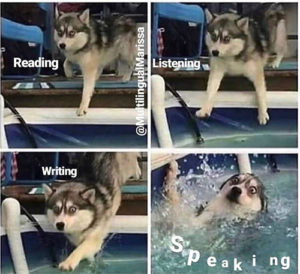
I make language memes on Instagram as @multilingualmarissa
Active vocabulary needs a different approach than passive vocabulary.
Because if all you’re doing is practicing how to listen to a language… well, all you’re practicing is listening!
Here are a few ways you can improve your active French vocabulary in the plan that this article is laying out.
- Work with a tutor – When I was working really hard on my French arts and culinary vocabulary, I hired tutors who were excited to just work on those parts of my French vocabulary with me and would create lesson plans around it. No grammar – just practicing what I was self-teaching! This is by far the most effective way to improve French vocabulary.
- Find an exchange partner – If you can’t afford a tutor, find a French native speaker who wants to improve their English and likes talking about the same things as you do. The best place to do this, in my experience, is on Instagram in the language learning community.
- French vocabulary journaling prompts – One thing I love to do is keep lists of new and exciting words while I take in my input. Then, I use them in sentences. Sometimes I just write a sentence per word, and sometimes I’ll pick three or four words at a time and have to write a whole page using each of them twice. (It can be tricky, but I love the challenge!)
- Post in comment sections – I am notorious for spamming French meme page comments sections with any thought that pops into my head. I love the French because if I misspell or misspeak, they will all descend upon me with corrections.
- Contribute to Wikipedia – Please only do this with a tutor’s editing help. However, one of my all-time favorite activities ever has been watching documentaries in French, writing up a few paragraphs, sending it to my tutor for corrections, then contributing it to Wikipedia. Your sense of accomplishment will be out of control. While this might be intimidating at first, I recognize that I don’t know any of them; I will never meet any of them in real life; and that they’re all giving me free tutoring. (Bonus points if you can follow people who write about your vocabulary topic and you react to their content with the new words you learned!)
Basically: write! Talk! And then write and talk some more!
Like with the active vocabulary, you want to work on speaking or writing French in a way that’s slightly hard for you but not impossible.
Plus, you want to keep your original goals in mind. Write and talk about the types of vocabulary you want to improve to reach those goals.
TIP: Make sure you’re using the grammar you already have. So for instance, if you only know present tense? Just write and speak in the present tense. Trying to suddenly start writing and speaking in additional tenses will tempt you to use robot translators like Google, and will defeat the purpose of this exercise. Keep the grammar simple and the vocabular interesting!
5. When all else fails… drill baby drill
“Memorizing” is a dirty word.
And I know why.
So if you hate to memorize: don’t do it. You don’t need this step.
Language anxiety is real, and it will kill your fire to improve your French vocabulary.
But I’m always honest with how my methods work for me, so I want to add this.
How to better memorize language vocabulary (but only if you want to)
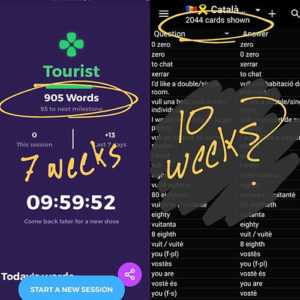
(Drops, left; Anki, right) In summer 2019 I did a comparative study of how many new French vocabulary words I could learn in a similar amount of time. Not only did I nearly double the number of words by using Anki, but I spent about 1/4 of the amount of time on the app daily and was significantly more confident using the words after. (Screen shot from my Instagram.)
One of the biggest “of course!” moments I’ve ever had with language learning was when a well known polyglot mentioned to me “well, most of the language learning is learning vocabulary, so why not spend most of our energy on it?”
It made sense of my bottlenecking French progress.
Every since switching my shift from general-learning-all-the-parts language learning to vocab! vocab! vocab!, I’ve noticed all of my languages improve much faster.
For me personally, the best method for how to learn vocabulary in a foreign language has been through active recall.
Active recall means seeing a prompt (let’s say a picture of a house) and actively bringing your knowledge of the word ( saying the word la maison).
No word banks, no clues.
For this, I use Anki. It’s by far my favorite app because on one side of the flashcards I can upload a picture of whatever I want. And on the other side, I can add color-coded words (to help me memorize gender) plus an audio file of a speaker saying them.
I’ll also say, however, that apps like uTalk can also be good for active recall and memorization. But, in my category-specific approach, I’ve found they’re all too general for my own goals. I like Anki because of how customizable it is and how much control I have over the flashcards.
But memorization (and by extension, Anki) doesn’t work by itself though.
I found that out the hard way.
You need to understand the word in a bigger context. You need to be familiar with the concept. And if you have an emotional connection with the word, you’ll be in good shape.
Which is why this at the bottom of the list. Steps #3 and #4 on this list are more important than memorization. (And if you do decide to memorize, they’re essential to give the new words you’re memorizing context.)
I’ll finish this quick section with a word of advice:
Interacting with words in creative and interesting ways for a long period of time is like furnishing a house.
While verbs might be your foundation and grammar the structure, all of your newfound French vocabularies will be the sunny windows, flowing curtains, overstuffed sofas, and gorgeous kitchen.
Memorizing just helps you make sure you have a key to every room.
But it won’t furnish your home like listening, speaking, writing, and reading will.
Your Personalized Strategy How to Improve French Vocabulary
Don’t let all this overwhelm you.
Languages are enormous, and all of them (including French) have more words than most of us could learn in a lifetime.
So to recap here’s what you’ll be doing:
- Set 3-5 goals
- Find many categories of vocabulary we’ll need
- Pick one category to start
- Find listening/reading immersion materials for that category
- Begin speaking and writing on that category
- (Optional flashcards or apps for memorizing)
- Once you’re happy with that category, complete 3-6 with another!
Now don’t forget: all of this will require some experimentation to find what works for you and doesn’t.
I hope this template for how to improve French vocabulary helps!
If you have problems or questions, feel free to leave them in the comments since others might share them and I’ll be happy to respond.
